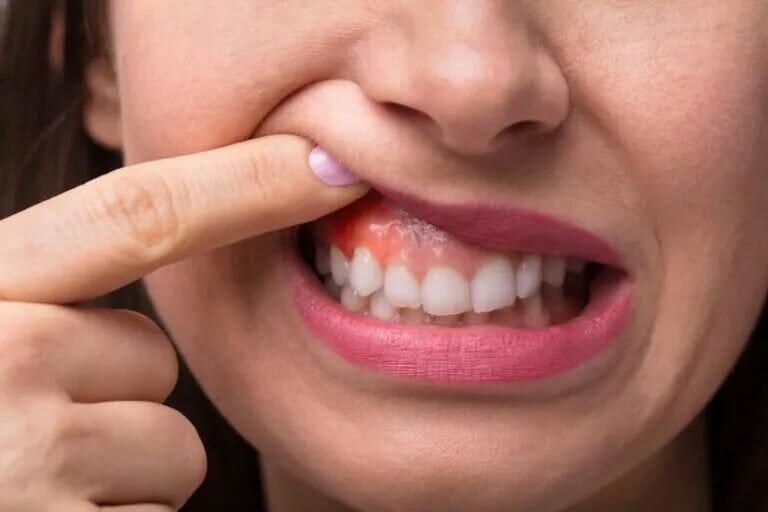We provide emergency dental care in Kitchener. If you're experiencing an achy tooth, sore gums, have broken a filling or any other oral health concern, give us a call today!
At Enamel Republic, we often use our lunch hour to accommodate dental emergencies for patients in the Kitchener-Waterloo area. This enables us to see dental emergencies on a same-day basis, where possible. If you are new to our office, don’t worry, as we are accepting new and emergency dental patients.
We also participate in a local emergency dental service arranged by the local Kitchener-Waterloo Dental Society. This enables our patients to have access to after-hours emergency dental care with either Dr. Hornby or other local emergency dentists.
A dental emergency commonly involves pain, infection or swelling of the teeth and/or gums. However, dental emergencies can also include oral trauma to the teeth, gums or jaws. We often see patients at our dental clinic for changes in other oral structures (like the cheeks, tongue, palate, throat and tonsils) that are concerning them, as well. Generally, we will book an emergency appointment for any patient that has a concern about their oral health.
So, feel free to call us for any oral health concerns that you have and we would be more than happy to offer you a consult or dental emergency appointment!
In Dentistry, there are some hallmark symptoms that define emergencies. Below, we'll outline some of the most common situations we see on an emergency basis.
If you're looking for helpful tips to better manage your dental emergency, see our "Helpful Tip" section at the end of each paragraph!
Sensitivity or Toothache

If you are experiencing a sudden increase in tooth sensitivity to pressure, hot, cold, sweet, and/or acidic stimuli (and it is unrelated to recent treatment) you should arrange for an assessment with our emergency dentist. After dental fillings, crowns, or bridges it can often take 1-4 weeks for post-appointment sensitivity to gradually diminish and this process is entirely normal. In other cases, sensitivity to hot, cold, sweet and or acidic stimuli can indicate that you have a cavity.
If this is the case, treatment is needed to eliminate symptoms. In other situations, sensitivity is due to gum recession and an exposed root surface. In these instances, treatment might not be required and your symptoms may be resolved by switching to an anti-sensitivity toothpaste like Sensodyne.
This means that, oftentimes, dental sensitivity or even pain may be a variation in "normal" or "healthy". Dental pain doesn't always mean that you need treatment or medication.
In some cases, however, you may need treatment to fill a cavity or repair a chipped tooth that you may not have detected on your own. All of this underscores the importance of having your Dentist take a look to see what is going on.
From there, you'll know if you require further treatment or if your symptoms are likely to taper off on their own.
Pressure sensitivity or toothache can often be related to presence of a tooth- or gum-related infection or abscess. Occasionally, these symptoms are associated with bruxing or grinding of teeth during daytime or night time.
Please contact our office to have your symptoms assessed so that we can help to make you comfortable again.
Helpful Tip: For cold, sweet or acid-related sensitivity, try using Sensodyne, or Colgate Anti-Sensitivity toothpaste for 1-2 weeks. Brushing with it will help. The trouble is that when you brush for 2 minutes and rinse, the ingredient that helps to dampen sensitivity doesn't have much contact time with your teeth. Try swishing around a pea-sized amount at nighttime before going to bed. Spit out the toothpaste or froth and go to bed. This will leave a reservoir of the anti-sensitivity ingredients in your saliva as you sleep.
If you're looking for a more natural toothpaste, use Risewell Hydroxyapatite toothpaste (hydroxyapatite is the natural building block in your tooth enamel and dentin) instead of Sensodyne but follow the same steps.
Swollen Gums?

Localized swelling of soft tissues is commonly associated with infection of gums or teeth. If you are experiencing swelling or drainage of pus, contact your Kitchener emergency dentist. Tooth infection or an “abscessed tooth” typically manifests as a “gum boil”, “bump”, or “gum pimple”. This is often accompanied by dull biting pain or discomfort.
Short-term treatment involves a course of prescription antibiotics. Unfortunately, antibiotics only dampen down symptoms of infection and do not provide a long-term solution. Definitive treatment of tooth-related infection involves root canal treatment or extraction of the affected tooth.
If you experience a larger swelling expanding toward the eye (from an upper tooth) or under the jaw or around the throat (from a lower tooth), go directly to the emergency department at your local hospital as intravenous antibiotics are likely to be required.
Broken or Detached Orthodontic Wires, Brackets or Retainers
Broken or detached orthodontic wires and brackets can be sharp and abrasive. They can scrape or even cut your lips, tongue or cheeks. Call our office as re-bonding of brackets and retainer wires is a short and simple procedure that can be completed at a Kitchener urgent dentist office.
Helpful tip: In advance of your appointment, you can purchase orthodontic wax at any major pharmacy – form a small ball with the wax and place over any sharp exposed contours to minimize risk of soft tissue trauma.

Call our Kitchener Family & Emergency Dental Clinic at (519)-576-8160 Or Schedule Your Appointment Online.
Broken or Fractured Tooth?
In most cases, broken or fractured teeth can be repaired by a simple filling or crown. Less frequently, teeth may break near to or exposing your tooth's nerve and root canal treatment may be required.
Rarely, a fracture extends through the entire tooth or deep under the gums rendering the tooth unrestorable or “un-fixable”. When this happens, tooth extraction is the only option. These kinds of catastrophic fractures commonly occur in un-crowned, root canal treated teeth.
Until treatment can be completed, discomfort can be minimized by chewing away from the affected tooth and avoiding temperature extremes. Even though your broken tooth might not be uncomfortable, try to avoid delaying your dental visit and treatment because prolonged exposure of the inside of your tooth may result in severe infection.
Helpful Tip: If your broken tooth is sensitive, you can paint on Clove Oil to decrease any pain. Clove Oil contains Eugenol which is a sedative for your tooth's nerve tissue. If you've broken a tooth and it is sharp or jagged, you can use orthodontic wax (or chewing gum) to stick over any sharp edges. Orthodontic wax can be purchased at your local pharmacy!
Call and book an appointment with Enamel Republic Family Dentistry today!
Tooth Trauma or Lost Tooth?

Sometimes teeth receive high impact trauma during sports, falls, etc.,. This is especially common in children during early walking stages. When a child receives a traumatic blow to the teeth, an immediate dental examination is required. Often, a mobile or loose tooth/teeth will be splinted to allow healing.
When a baby tooth is lost during trauma it should not be replanted in the socket as this could lead to ankylosis, a process by which bone heals directly against the tooth root. This can lead to complications when the baby tooth is due to exfoliate and be replaced by an adult tooth.
If your child’s baby tooth is knocked loose, clean it and place it in a small container filled with milk. Bring it to your dental provider for a full assessment.
When an adult tooth receives a traumatic blow and is loosened, splinting will provide stabilization so that the gums and periodontal ligament can heal properly around the tooth’s root. Occasionally, a root canal treatment is required should an abscess form around the root of the tooth. You should avoid biting and/or chewing of food with the traumatized tooth/teeth. Where an adult tooth is knocked out of its socket, clean the tooth, place in a small container filled with milk, and bring it with you to your dental appointment.
Jaw Pain, Stiffness and/or Clicking
Jaw pain and jaw clicking are both common patient concerns. Sometimes these signs and symptoms follow trauma to the face. Other times, these symptoms come and go for a given patient. Patients may also experience jaw stiffness from time to time.
Jaw dysfunction or disorder (commonly TMJD or TMD) is commonly related to patient clenching and/or grinding during the day or while sleeping.
Helpful Tip:
Some common home remedies for jaw dysfunction include:
Food Stuck under Your Gums
This may not sound like a dental emergency but having food stuck under your gums (popcorn kernels are a really common source) can become painful and even cause infection in some instances.
Over a period of days, whatever is stuck under your gums can provide a rich fuel source for harmful bacteria. As these bacteria multiply and produce toxins, they can cause swelling, infection and pain.
So what can you do?
Helpful Tip:
Floss may help to dislodge whatever is under your gums, however, often times deeper access is necessary. Generally, a Waterpik can help to flush out gum pockets and dislodge larger food fragments that may be causing pain.
Be careful to avoid using sharp tools to "fish out" what's lodged underneath your gums as this can lead to damage of teeth and soft tissues in the mouth.
If you have difficulty dislodging the food fragment from under your gums, call your Kitchener emergency dental office to arrange an examination and emergency dental services.
On occasion, you may need to be seen or evaluated as a follow up to dental treatment. You will usually notified by your dentist about things to watch our for after dental care. These complications may arise after a dental filling, root canal treatment, tooth extraction or other dental procedure.
Post-Operative Sensitivity
It's fairly normal to experience temperature sensitivity and/or chewing sensitivity after new fillings. Any procedure involving removal of natural tooth structure (such as during treatment for cavities or tooth preparation for a crown), will cause some irritation of your tooth's nerve. The result is often transient tooth sensitivity.
Sometimes, after treatment of a deep cavity near your tooth's nerve, the sensitivity won't go away and you'll require further treatment. In most cases, however, the post-treatment sensitivity will go away on its own.
A typical thing you'll hear from you Dentist is, "give us a call if the sensitivity lasts longer than 2 weeks". If your sensitivity isn't going away, you may want to call your Dentist for a follow up appointment.
A "High" Bite
When your Dentist places a dental filling, they'll check to make sure it doesn't prevent you form closing fully and comfortably. However, it can be challenging to bite in a fully closed resting position when you're numb. Occasionally, this results in noticing a filling that feels too big or "too high" when your dental freezing wears off.
If it feels like you're hitting a bump or biting on a seed when you close your teeth together after a filling, give your Dentist a call so that they can adjust the filling for you.
This will enable you to close comfortably with your new filling in place.
Dry Socket after Tooth Extraction
"Dry Socket" is a common, post-dental-extraction complication especially in smokers. It's also common in non-smokers after wisdom tooth removal.
Dry socket occurs when the early blood clot that occupies an extraction socket falls out. This leaves the bony walls of the socket (and a bunch of tiny nerve endings) exposed. Dry socket brings with a characteristic burning ache or pain.
If you're experiencing a burning ache that won't go away after tooth extraction, call your Dentist so they can assess the cause of your pain and help you to get the relief you deserve.
Update (Sept 23rd, 2021): Additional Tips for Managing Dental Emergencies
While most dental emergencies are likely to require treatment, many can be improved or made more comfortable by suitable at home management.
Below, we've provide some tips and helpful information for increasing your comfort as you cope with your dental emergency.
Managing Soft Tissue Injuries
When you sustain a trauma injury to teeth, oftentimes there may be scraping or laceration of lips or cheeks. The soft tissue injuries need the same level of attention as do injuries directly to teeth.
Typically, they will help to clean a soft tissue wound. They will also recommend an antibiotic ointment to prevent infection in most cases. Some Dentists may be comfortable with closure and stitching of any intra-oral wounds or tears.
Post-treatment, Children who are numb may chew or bite their cheek because they find the rubbery feeling of these parts unique. This can cause significant post-treatment injury and your child will be in significant discomfort once anesthetic wears off.
Try to monitor your child after treatment and encourage them to avoid biting or chewing on their lip. It is best practice to wait for local anesthesia to wear off completely before allowing them to eat
Managing Dental Pain
Commonly, a dental emergency comes with symptoms, discomfort or pain. In the majority of situations, the pain is either inflammatory in nature or due to infection. Even pain brought on by infection has an inflammatory component. For this reason, most patients can reduce discomfort by taking Non-Steroidal Anti-Inflammatories (NSAIDs). These medications include Advil, Motrin and Alleve and they are generally superior to Tylenol when it comes to managing dental pain.
Note: Consult a Dentist, Pharmacist or Physician before choosing an over-the-counter pain medication.
Will an Emergency Dentist extract teeth?
A Dentist providing emergency dental services will evaluate need for tooth extraction at your emergency dental appointment. Some dentists provide Oral Surgery and Tooth Extraction while others may not. If you have a tooth infection or abscess, your dentist will at the very least prescribe an Antibiotic to curtail harmful swelling.
At Enamel Republic, we provide simple and surgical extraction services on an emergency basis.
Will a Hospital Treat My Dental Emergency?
Does the ER staff include a Dentist?
Some hospitals have an on-call Dentist that may provide emergency dental treatment. In many cases, however, the hospital staff will refer you to an external, on-call dentist.
Will OHIP Cover My Emergency Dental Costs?
This is a commonly asked question. Typically, purely dental emergencies, such as a dental abscess or broken tooth, require treatment that won't be covered by OHIP.
In some cases where the dental emergency involves a jaw fracture or major trauma injury, your treatment may be covered by OHIP. In many of these cases, your emergency dental situation will be resolved in a hospital setting.
Is there an Emergency On-Call Dentist for Waterloo Region?
Yes!
The Waterloo-Wellington Dental Society (WWDS) runs an emergency on-call service for dental patients in Waterloo Region. This emergency dental service exists to help treat broken teeth, dental pain, and dental infections outside of typical business hours.
To access the phone number for the Waterloo region emergency on-call dental service, call your family dentist and they'll have the emergency on-call number on their voicemail (note: your Dentist is required to be an actively participating member in the on-call service for you to have this benefit).
Does Emergency Dental Care cost more? While an emergency dental procedure does not cost more than the same procedure in a non-emergency scenario, the need for an emergency examination and possibly x-rays prior to treatment will increase fees. Prices corresponding to emergency exams and radiographs appear below.
Emergency dental examinations (not including any required treatment) are billed according to the Ontario Dental Association Fee Guide. The 2019 Fee Guide suggests a cost ranging from $45 – $130, depending on the length of time required to provide a proper assessment. Radiographs (X-Rays) are an additional cost typically in the $30 – $80 range depending on the number and type of image required.
These are purely assessment cost estimates and do not include the cost of potential necessary treatments. Best practice is to call your local dentist's office or family dentist and inquire about fee ranges and estimates on emergency dental services. It is also advisable to obtain a cost estimate in advance of any necessary treatment.
Routine Dentistry & Tooth Repair
Oral Surgery & Tooth Removal
Prosthetic Dentistry & Tooth Replacement
Protective/Preventive Services
Teeth Whitening

OFFICE HOURS